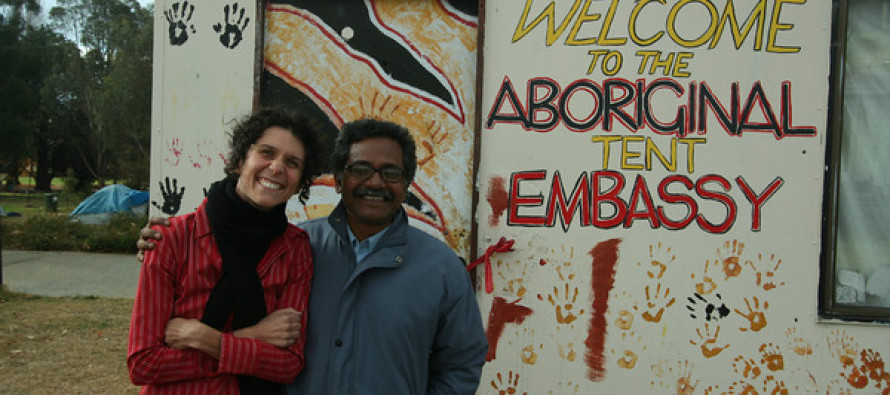Bangladeshi Economist urges Australia to oppose Phulbari coal mine By Flint Duxfield

Visiting professor Anu Muhammad from Jahangirnagar University, Bangladesh, has called on the Australian government not to support the construction of one of the world’s largest coal mines in the Phulbari region of northern Bangladesh.
Prof. Muhammad recently toured Australia meeting with politicians and delivering public lectures on the impacts of climate change in Bangladesh and the need to prevent so-called ‘development’ projects, such as the Phulbari coal project, which threaten the livelihoods of communities and destroy the environment.
Should it to go ahead, the Phulbari coal mine is expected to negatively affect up to 470,000 people and destroy one of Bangladesh’s most fertile agricultural food producing regions. The construction of a large off-shore coal loading facility to export the coal also threatens to pollute the largest mangrove forest on earth, the world heritage listed Sundarbans reserve. In addition, combustion of the 550 million tones of coal the mine is expected to produce would further exacerbate the global climate crisis which will inflict its most severe impacts on low lying, densely populated countries such as Bangladesh.
While the environmental and social costs of constructing the mine are considerable, the benefits for Bangladesh are minimal with 80% of the coal from the mine being exported and at least 94% of the ownership of the mine going to Anglo-Australian company, Asia Energy.
Three people were killed and hundreds injured in August 2006 when a crowd of over 100,000 people peacefully opposing the mine was fired upon by a government paramilitary force. In the national protests which followed the killings the Bangladeshi government was forced to accede to demands of the protestors to stop the mine going ahead and to oust Asia Energy from the country.
Since the declaration of emergency rule in January 2007 however, the Bangladeshi government has been showing reluctance to fulfill the agreement made with the people of Phulbari, and Asia Energy remains in the country.
In spite of its potentially catastrophic social and environmental impacts and the considerable local opposition to the mine, the Asian Development Bank (ADB) is considering providing US$300m in aid money to enable the project to go ahead. In order to confirm international funding and local ally Asia Energy has been busy in lobbying, bribing consultants-media-officials-thugs, creating conflict within community and spreading corruption.
Prof Muhammad was invited to Australia by aid monitoring organization AID/WATCH to share the concerns of Phulbari community members with the Australian public and politicians.
Australia is the fifth largest donor to the ADB, maintaining a permanent directorial position on the ADB board and an important vote in determining whether the Phulbari project is approved.
The speaking tour visited Sydney, Melbourne, Brisbane, Canberra, Newcastle, Katoomba and Musswelbrook last month and included meetings with mining communities in Australia’s chief coal-mining region, the Hunter valley. During his stay, Prof Muhammad also visited the Aboriginal Tent Embassy and met with members of the aboriginal community.
Prof. Muhammad highlighted the need to ensure that the people of Bangladesh, and particularly of communities which will be impacted by coal mining, retain control over Bangladesh’s coal to ensure that it is only extracted if it can be done in a way which does not harm the environment or destroy community’s livelihoods. “If companies like Asia Energy are allowed to take control of Bangladesh’s coal resources they will do so without any concern for the impacts on local people or the environment, or for the development of Bangladesh’s economy.”
This was reiterated by Mr. Nazrul Islam, a former BHP geologist who initially discovered Bangladesh’s rich coal reserves for the Australian mining giant. Mr Islam commented that he would never have shown BHP the Phulbari coal deposits had he know the kind of large scale open cut mining which was envisaged by the company. “This coal reserve was never intended to be an open-cut mine. Conducting open cut coal mining in Bangladesh would not only be incredibly destructive to the environment and socially catastrophic, it would be geologically impossible in a country with so many underground waterways and such a high annual rainfall”.
Prof. Muhammad also stressed the importance of viewing the issues of climate change from a social justice perspective “Countries like Australia and the US are disproportionately responsible for causing climate change, but it is countries like Bangladesh which will be worst affected by the global warming. There is an urgent need for those industrialized countries which have already profited considerably from through their uncompromising exploitation of the planet’s resources, to provide compensatory climate financing to the majority world to fund their transition to renewable energy sources which uphold their right to development”.
Prof Muhammad reiterated the urgency of developing international grassroots campaigns to respond to the increasing proliferation of the neoliberal development paradigm. “If institutions such as the Asian Development Bank or any other international financing organization continue to promote growth-led development, which prioritises the profit of companies over the lives of people there is also a strong need to globalise our opposition to these institutions and their neoliberal policies.”


